Workshop Crane Buyer's Guide: Types, Prices & Selections for You
Workshop Crane Buyer's Guide: Types, Prices, and Selecting the Right Crane for Your Needs
Workshop Cranes are indispensable tools in various industries, offering efficient material handling and precision lifting capabilities. Selecting the right Workshop Crane for your specific application requires careful consideration of types, prices, and your unique requirements. In this buyer's guide, we'll walk you through the key factors to help you make an informed decision.
Types of Workshop Cranes
Workshop cranes come in various types, each designed for specific applications and workspace configurations. Here are the main types of overhead workshop cranes, workshop gantry cranes, and workshop jib cranes:
Overhead Workshop Cranes:
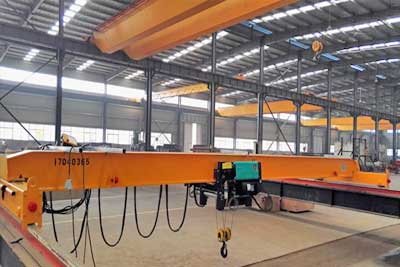
Single Girder Overhead Bridge Cranes:
- - These cranes have a single beam (girder) that runs along the overhead runway.
- - Suitable for lighter lifting tasks in smaller workshops and warehouses.
- - Economical and space-efficient.
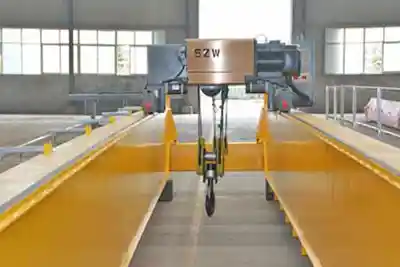
Double Girder Overhead Bridge Cranes:
- - Feature two parallel beams (girders) for increased stability and lifting capacity.
- - Ideal for heavy-duty applications, such as manufacturing and steel mills.
- - Offers greater lifting heights and capacities compared to single girder cranes.
Workshop Gantry Cranes:
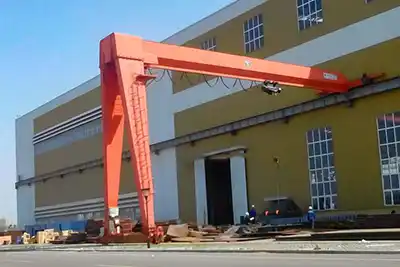
- - Supported by a single vertical leg on one side, with the other side mounted on wheels or casters.
- - Suitable for lighter loads and smaller workspaces.
- - Offers mobility and flexibility in moving materials.
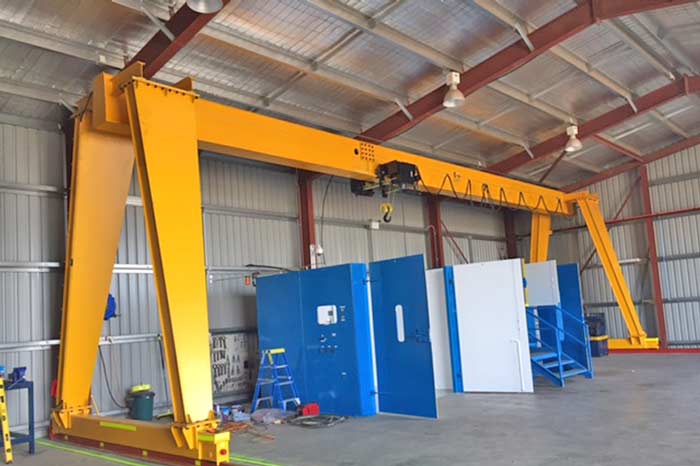
Double Leg (A-Frame) Gantry Cranes:
- - Supported by two vertical legs, resembling an "A" shape.
- - Offers greater stability and lifting capacity compared to single-leg gantry cranes.
- - Suitable for medium to heavy-duty applications.
Workshop Jib Cranes:
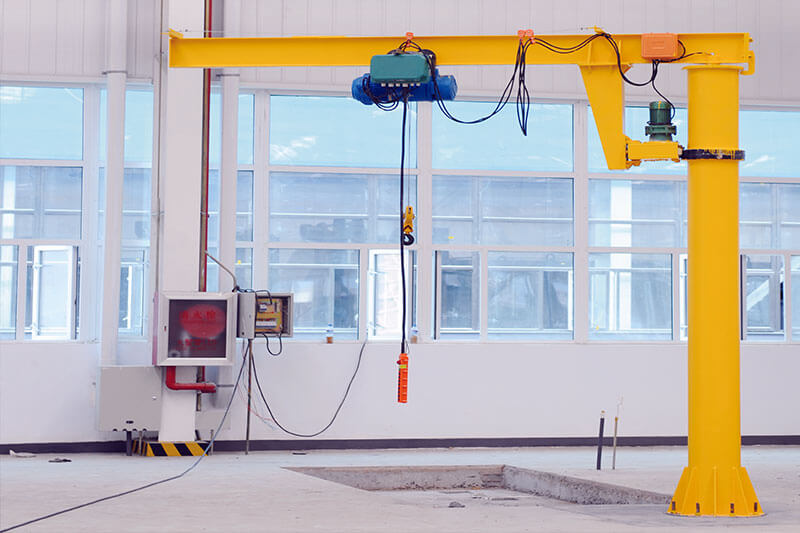
- - Stand on their own base or foundation, without the need for support from the building's structure.
- - Commonly used in smaller workshops and areas with limited space.
- - Offers 360-degree rotation for precise material handling.
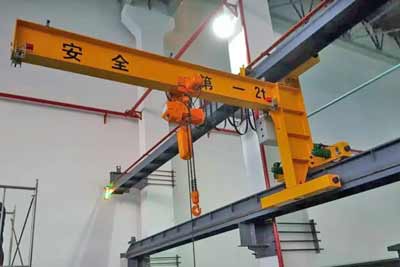
Wall-Mounted Travelling Jib Cranes:
- - Attached to the building's walls or vertical columns.
- - Ideal for optimizing floor space and providing a fixed lifting solution.
- - Offers 180 to 200-degree rotation.
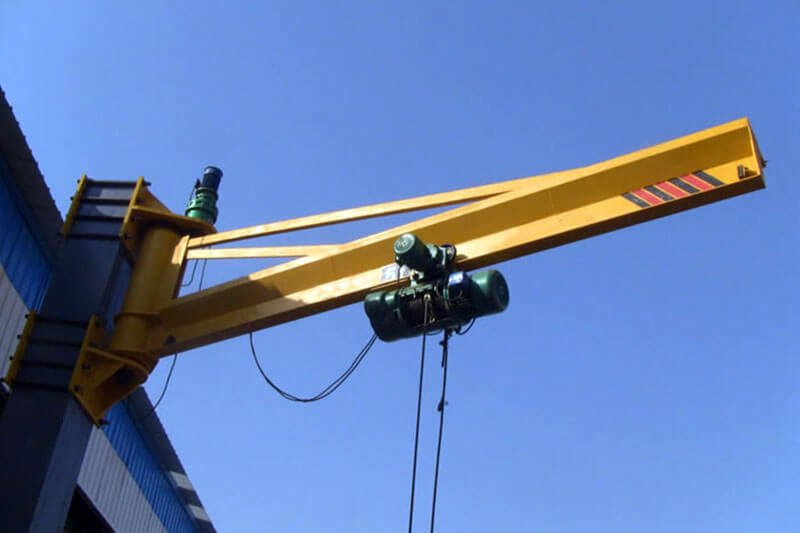
Column-Mounted / Wall Mounted Jib Cranes:
- - Mounted on vertical columns or pillars within a workshop.
- - Offers high lifting capacity and a wide range of motion.
- - Suitable for heavy-duty lifting and large workspaces.
Each type of workshop crane has its advantages and is designed to meet specific lifting requirements. When selecting the right crane for your workshop, consider factors such as lifting capacity, available workspace, and the type of materials you need to handle. Additionally, consulting with a crane expert or manufacturer can help you make an informed decision based on your unique needs.
Industrial Applications of Workshop Cranes
What are the specific applications in automotive manufacturing?
Workshop cranes play a crucial role in automotive manufacturing by facilitating the handling of heavy components such as engines, transmissions, chassis, and body panels. They are used for tasks such as lifting and positioning vehicle frames onto assembly lines, moving large components between workstations, and loading finished vehicles onto transport trucks. Additionally, workshop cranes are employed in maintenance areas for lifting and replacing vehicle components during repair and assembly operations.
How are they utilized in metalworking workshops?
In metalworking workshops, workshop cranes are utilized for various tasks related to the fabrication and machining of metal components. They are used to lift and transport raw materials such as steel beams, plates, and pipes to machining centers or fabrication stations. Workshop cranes also assist in moving workpieces between machining tools, positioning them for cutting, drilling, welding, and other metalworking processes. Additionally, workshop cranes are employed for loading and unloading materials from CNC machines, presses, and other metalworking equipment.
How are they utilized in woodworking workshops?
Workshop cranes play a significant role in woodworking workshops by aiding in the handling of large and heavy wood materials such as lumber, plywood, and finished wood products. They are used for tasks such as lifting and transporting timber logs from storage areas to cutting or milling machines, moving large panels between workstations, and positioning finished wood products for assembly or packaging. Workshop cranes also assist in loading and unloading wood materials from trucks or storage racks, facilitating efficient material flow and production processes in woodworking workshops.
How are workshop cranes used in the construction industry?
What are their roles in building construction?
Workshop cranes are integral to building construction projects, where they are used for tasks such as lifting and positioning structural steel beams, concrete panels, and prefabricated building components. They assist in erecting scaffolding, hoisting building materials to upper floors, and placing heavy equipment such as HVAC units and generators. Workshop cranes also play a key role in assembling formwork and reinforcing steel for concrete pours, as well as in the installation of curtain walls, glass panels, and other architectural elements.
How are they involved in bridge construction?
In bridge construction, workshop cranes are utilized for lifting and placing structural components such as bridge girders, beams, and segments. They assist in assembling bridge decks, lifting and positioning precast concrete elements, and installing bridge bearings and expansion joints. Workshop cranes also aid in the construction of bridge piers and abutments, providing support for formwork and reinforcement placement. Additionally, workshop cranes are used for bridge maintenance and repair tasks, including the replacement of bridge components and the inspection of structural integrity.
How are workshop cranes used in warehousing and logistics?
What tasks do they perform in distribution centers?
In distribution centers, workshop cranes are employed for tasks such as loading and unloading palletized goods from trucks and containers, stacking and retrieving warehouse shelves, and moving heavy items to and from storage areas. They facilitate the efficient movement of goods within the warehouse, reducing manual labor and improving productivity. Workshop cranes also assist in order picking and fulfillment processes, speeding up order processing and shipment preparation.
How are they utilized in freight handling?
Workshop cranes play a vital role in freight handling operations, where they are used for tasks such as loading and unloading shipping containers from trucks, railcars, and ships. They assist in lifting and moving heavy cargo containers, oversized machinery, and equipment onto and off of transportation vessels. Workshop cranes also aid in the sorting and staging of freight for distribution, ensuring timely and accurate delivery of goods to their destinations. Additionally, workshop cranes support maintenance and repair activities for transportation vehicles and equipment in freight handling facilities.
How are workshop cranes used in the aerospace industry?
What are their applications in aircraft manufacturing?
In aircraft manufacturing, workshop cranes are utilized for tasks such as lifting and positioning aircraft fuselages, wings, engines, and other components during assembly. They assist in transporting aircraft sections between assembly stations, installing landing gear and control surfaces, and maneuvering heavy equipment such as wing jigs and fuselage fixtures. Workshop cranes also support aircraft painting and finishing processes, providing precise positioning for spray booths and paint booths.
How are they utilized in Maintenance, Repair, and Overhaul (MRO) facilities?
In Maintenance, Repair, and Overhaul (MRO) facilities, workshop cranes are used for tasks such as lifting and positioning aircraft engines, landing gear, and other components during maintenance and repair operations. They assist in removing and replacing aircraft components for inspection, repair, and overhaul, as well as in the installation of avionics and cabin interiors. Workshop cranes also support aircraft painting and stripping processes, providing access and support for maintenance personnel working on aircraft exteriors and interiors.
How are workshop cranes used in the shipbuilding and maritime industry?
What roles do they play in shipyard operations?
In shipyard operations, workshop cranes are essential for lifting and positioning ship components such as hull sections, decks, and superstructures during vessel construction. They assist in assembling ship modules, installing propulsion systems, and outfitting interiors with equipment and furnishings. Workshop cranes also support ship launching and dry-docking operations, providing lifting and support for vessels during launching and maintenance activities.
How are they involved in port operations?
In port operations, workshop cranes are used for tasks such as loading and unloading cargo ships, containers, and bulk carriers. They assist in lifting and moving shipping containers from dock to vessel and vice versa, as well as in transferring cargo between ships and storage yards. Workshop cranes also support port infrastructure maintenance and repair tasks, including the installation and replacement of dockside equipment such as fenders, bollards, and mooring systems. Additionally, workshop cranes aid in handling oversized cargo and heavy equipment for specialized shipping operations in ports.
Advantages of Workshop Cranes
How do workshop cranes improve efficiency in material handling?
Workshop cranes improve efficiency in material handling by providing fast and precise lifting, positioning, and transportation of heavy loads. They enable quick loading and unloading of materials, streamline workflow by reducing downtime, and facilitate smooth movement of goods within the facility. With their ability to lift heavy loads with ease and accuracy, workshop cranes help minimize material handling time and optimize production processes, ultimately improving overall efficiency in industrial operations.
How do workshop cranes increase safety for workers?
Workshop cranes increase safety for workers by reducing the need for manual lifting and handling of heavy loads, which can lead to injuries and accidents. By automating material handling tasks, workshop cranes minimize the risk of musculoskeletal injuries caused by repetitive lifting and strain. Additionally, workshop cranes are equipped with safety features such as overload protection, emergency stop controls, and collision avoidance systems to prevent accidents and protect workers from harm. By promoting a safer working environment, workshop cranes help minimize workplace accidents and contribute to improved worker safety and well-being.
What flexibility do workshop cranes offer in handling different load sizes and shapes?
Workshop cranes offer flexibility in handling different load sizes and shapes by providing customizable lifting solutions to meet specific application requirements. They come in various configurations, including overhead cranes, gantry cranes, and jib cranes, with adjustable capacities, spans, and reach capabilities. Workshop cranes can be equipped with different types of lifting attachments, such as hooks, slings, and magnets, to accommodate a wide range of load sizes and shapes. This flexibility allows workshop cranes to handle diverse materials, from small components to large machinery, and adapt to changing production needs with ease, enhancing operational versatility and efficiency.
How do workshop cranes reduce manual labor and fatigue?
Workshop cranes reduce manual labor and fatigue by automating material handling tasks that would otherwise require manual lifting and carrying by workers. By utilizing workshop cranes to lift and move heavy loads, workers can avoid physically demanding tasks that can lead to fatigue, strain, and injury. Workshop cranes also enable workers to operate equipment from a safe distance, minimizing exposure to hazardous environments and reducing the risk of accidents. Additionally, workshop cranes are designed with ergonomic features such as adjustable controls and operator platforms to enhance operator comfort and reduce fatigue during prolonged use. By reducing the physical demands on workers, workshop cranes help improve productivity, morale, and overall workplace safety.
Installation and Operation of Workshop Cranes
What is involved in the crane installation process?
What are the structural support requirements?
The crane installation process involves ensuring adequate structural support to bear the weight of the crane and the loads it will lift. This includes assessing the building's structural integrity, determining suitable attachment points for mounting the crane, and reinforcing the support structure as necessary to withstand the crane's weight and dynamic loads during operation.
What is involved in electrical and power supply installation?
Electrical and power supply installation for workshop cranes includes wiring the crane's electrical components, such as motors, controls, and safety devices, to the building's power source. This involves coordinating with electricians to install wiring, conduits, and electrical panels according to local electrical codes and safety standards. Power supply considerations also include ensuring adequate voltage and phase compatibility to meet the crane's operating requirements.
What are the procedures for operating workshop cranes?
What training and certification are required for operators?
Operating workshop cranes requires specialized training and certification to ensure safe and proficient operation. Operators must undergo comprehensive training programs covering crane controls, load handling techniques, safety procedures, and emergency protocols. Certification programs assess operators' knowledge and skills and certify their competency to operate cranes safely and effectively. Ongoing training and refresher courses are also essential to keep operators updated on the latest safety standards and operating procedures.
What safety protocols and precautions should be followed during operation?
Workshop crane operation involves following strict safety protocols and precautions to prevent accidents and ensure the safety of workers and bystanders. This includes conducting pre-operational checks to inspect the crane for any defects or malfunctions, verifying load capacities and rigging configurations, and securing the work area to prevent unauthorized access. During operation, operators must adhere to safe operating practices, such as avoiding sudden movements, maintaining clear communication with ground personnel, and observing load limits and environmental conditions. Additionally, operators should be trained to respond quickly and effectively to emergencies, such as power failures, equipment malfunctions, or crane accidents, by following established emergency procedures and protocols.
Maintenance and Inspection of Workshop Cranes
What is the regular inspection schedule for workshop cranes?
The regular inspection schedule for workshop cranes typically includes daily, weekly, monthly, and annual inspections. Daily inspections involve visually checking the crane for any visible signs of damage, wear, or malfunction before each shift. Weekly inspections involve more detailed checks of critical components such as hoists, trolleys, and controls. Monthly inspections focus on verifying the proper functioning of safety devices, electrical systems, and structural components. Annual inspections are comprehensive examinations conducted by qualified inspectors to assess the overall condition and safety compliance of the crane.
How are moving parts lubricated and maintained?
Moving parts of workshop cranes, such as bearings, gears, and pulleys, are lubricated and maintained to ensure smooth and efficient operation. Lubrication schedules are established based on manufacturer recommendations and usage conditions, with appropriate lubricants applied to moving parts to reduce friction, prevent wear, and prolong component life. Regular maintenance activities, such as cleaning, greasing, and adjusting, are performed to keep moving parts in optimal condition and prevent premature failure or breakdown.
What is involved in repairing and replacing crane components?
Repairing and replacing crane components involves identifying and addressing any issues or deficiencies discovered during inspections or maintenance activities. This may include repairing damaged or worn components, replacing defective parts, or upgrading outdated equipment to meet current safety standards. Repairs and replacements are carried out by qualified technicians using manufacturer-approved procedures and genuine replacement parts to ensure the integrity and reliability of the crane system.
How do workshop cranes comply with OSHA and industry standards?
Workshop cranes are designed, manufactured, installed, and operated in compliance with Occupational Safety and Health Administration (OSHA) regulations and industry standards to ensure the safety of workers and compliance with applicable laws. This includes adherence to standards such as OSHA 1910.179 for overhead and gantry cranes, ANSI/ASME B30 series for lifting equipment, and CMAA 70 for crane maintenance. Workshop cranes undergo rigorous testing, inspection, and certification processes to verify compliance with safety and performance requirements before being put into service. Additionally, regular inspections, maintenance, and operator training programs are implemented to uphold safety standards and regulatory compliance throughout the crane's service life.
Factors Influencing Workshop Crane Prices
Workshop Crane prices can vary based on several factors. Understanding these factors will help you budget effectively:
- 1. Type and Configuration: The type of crane you choose significantly affects the price. Overhead Bridge Cranes tend to be more expensive due to their complexity, while Jib Cranes are generally more budget-friendly.
- 2. Lifting Capacity: Cranes with higher lifting capacities come at a higher price. Ensure you select a crane with a capacity that matches your needs without overpaying for excessive capacity.
- 3. Span and Reach: Longer spans and greater reaches require more robust structures, which can increase the price.
- 4. Customization: If you require specialized features or attachments, customization may add to the cost. However, it ensures the crane meets your unique requirements.
- 5. Quality and Brand: Reputable brands often command higher prices, but they offer reliability, durability, and better after-sales support.
Selecting the Right Workshop Crane
Now that you understand the types and pricing factors, here's how to choose the right Workshop Crane for your application:
- 1. Assess Your Needs: Start by evaluating your lifting requirements, available workspace, and any unique demands of your application.
- 2. Consider Mobility: If you need a mobile crane, Gantry Cranes are a good choice. For fixed positioning, Overhead Bridge Cranes or Jib Cranes may be more suitable.
- 3. Factor in Load Capacity: Ensure the crane's load capacity matches your heaviest loads. Remember to account for future growth.
- 4. Think About Space: Consider the available space in your workshop. Overhead Bridge Cranes require sufficient headroom, while Jib Cranes are ideal for confined spaces.
- 5. Safety Features: Look for essential safety features like overload protection, limit switches, and emergency stop buttons.
- 6. Customization: If your application has unique requirements, discuss customization options with the manufacturer.
- 7. Budget Wisely: Balance your budget with the crane's quality and capabilities. Remember that a higher upfront cost can lead to long-term savings through reduced maintenance and downtime.
- 8. Get Expert Advice: Consult with Workshop Crane experts or manufacturers to ensure you make an informed decision.
Why Choose Yuantai Crane
When it comes to Workshop Cranes, Yuantai Crane stands out as a reliable and innovative manufacturer and supplier. Here are some advantages and benefits of choosing Yuantai Crane for your lifting solutions:
- 1. Quality and Reliability: Yuantai Crane is known for producing high-quality, reliable Workshop Cranes built to last. Our cranes undergo rigorous testing to ensure they meet the highest industry standards.
- 2. Diverse Product Range: We offer a diverse range of Workshop Cranes, including Overhead Bridge Cranes, Gantry Cranes, and Jib Cranes, catering to various industries and applications.
- 3. Customization: Yuantai Crane specializes in customization, tailoring cranes to meet your specific requirements. We work closely with you to design the ideal crane solution for your unique needs.
- 4. Innovative Technology: Our cranes incorporate innovative technology, enhancing safety, efficiency, and ease of use. We stay at the forefront of crane technology to deliver cutting-edge solutions.
- 5. Competitive Pricing: While we offer top-quality cranes, we remain competitive in pricing, ensuring you receive excellent value for your investment.
- 6. After-Sales Support: Yuantai Crane provides comprehensive after-sales support, including maintenance, repairs, and technical assistance. We're committed to the long-term success of your crane operations.
- 7. Global Presence: With a global presence, we can serve clients worldwide, offering timely deliveries and support wherever you are located.
- 8. Proven Track Record: Our extensive portfolio of successful projects across industries demonstrates our expertise and reliability in providing crane solutions.
By choosing Yuantai Crane, you not only invest in a Workshop Crane but also gain a trusted partner dedicated to your success. We're here to assist you in finding the ideal Workshop Crane solution tailored to your unique requirements. Your satisfaction and operational efficiency are our top priorities.




